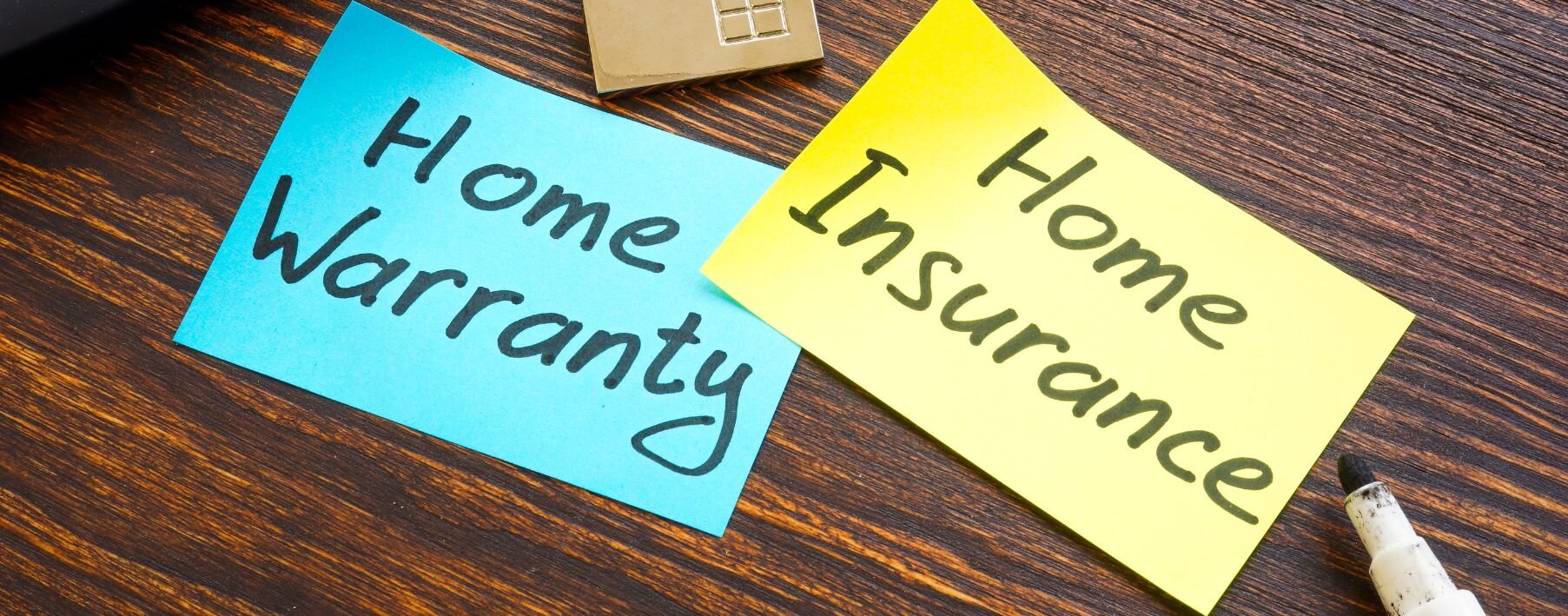Home Warranty Vs. Home Insurance Compared [Cover Wisely]

Whether you plan to buy a house or already own one, a home warranty and homeowners insurance can provide financial protection if something goes awry. However, home warranty and home insurance aren't the same.
Although their coverages differ, homeowners insurance and home warranties can complement one another and offer optimal protection against unexpected expenses.]
No matter how dedicated you are to your monthly home maintenance checklist, it’s always beneficial to have additional coverage. Want to ensure your investment is fully secure?
This article will explain everything about home warranty vs. homeowners insurance so you can decide when you need one or both.
Key takeaways
- A home warranty covers repairs and replacements of household appliances and systems such as HVAC, plumbing, and electrical systems due to normal wear and tear.
- Homeowners insurance protects your home and belongings against sudden, unforeseen events like theft, vandalism, and fires.
- Home warranty plans typically have coverage limits and service fees.
- If you have a mortgage, your lender will require you to get home insurance. Home warranties, on the other hand, are optional.
- It's best to buy home insurance and a home warranty for convenience and peace of mind.
What is the difference between a home warranty and homeowners insurance?
Homeowners often wonder, "Is a home warranty the same as home insurance?"
While both policies help protect your home, there is a difference between home insurance and home warranty in terms of the type of coverage they provide.
Homeowners insurance covers damage to your home's structure and contents from certain incidents. In contrast, a home warranty covers your systems and household appliances from general wear and tear or old age. Both require annual premiums and cover some – not all – appliances.
Another key difference between a home warranty and home insurance is that a home warranty isn't mandatory, unlike home insurance, which is required by mortgage lenders for a mortgage loan.
Sellers and realtors may provide a home warranty with a new home purchase, but it's optional to buy.
What is a home warranty?
Also called home repair insurance, a home warranty is a service contract that helps cover repairs and replacements for various household appliances and home systems, such as an HVAC system, plumbing, dryer, washer, and refrigerator.
With an annual or monthly fee, you receive a flat rate on service calls. These warranty contracts usually last one year, but you can renew them annually.
If a system or an appliance covered by the plan breaks down, your home warranty company sends a technician to repair it or, if needed, replace it. You may have to pay service call fees.
A home warranty plan typically comes with coverage limits. For instance, a contract might cover up to $2,000 per year for each appliance, with a yearly claim limit of $16,000.
If you get a home warranty when you buy a house, coverage immediately comes into effect. But if you purchase a warranty for the house you own, you may have to wait 15-30 days for coverage to begin.
How much is a home warranty?
Although the cost of a home warranty can vary based on the level of coverage and the provider, it largely depends on two fees:
- Monthly or annual fee: This allows you to access discounted service calls. Homeowners may pay $500 per year or more for a basic plan, based on the location and coverage plan.
- Service fee: This is a fee you pay each time you need a repair for a covered system or appliance. Service fees can range from $75 to $150 per call. If a homeowner pays more for an annual or monthly payment, the service fee may be lower.
Note: A home warranty is different from a builder warranty. A home warranty is a service contract to fix or replace items in an existing home. On the contrary, a builder warranty covers a newly built house, including the electrical systems, plumbing, and concrete floor.
What does a home warranty cover?
The appliances and mechanical systems have a lifespan. When they get damaged, repairing or replacing them can be costly.
A home warranty covers service, repair, or replacement for major household appliances and systems that get damaged or malfunction due to normal wear and tear.
The coverage typically includes:
- Appliances: Dishwashers, ovens, refrigerators (doesn't include the ice maker)
- Systems: HVAC, plumbing, electrical
- Typical add-ons: Pool pumps, septic tanks, well pumps
Some companies provide "cafeteria plan" home warranties, where you choose what items are covered.
A home warranty will only cover what's listed in the contract. So, when you buy one, read the fine print to ensure the appliances and systems you care about are covered.
Limitations and exclusions in a home warranty
Are you wondering, "Does homeowners insurance cover HVAC systems?" It does, but with a few caveats. Similarly, a home warranty doesn't cover everything.
Here are some common exclusions and limitations.
- Pest Damage: Some plans include pest removal but not the damage caused by rodents, termites, or other pests.
- Pre-existing Conditions: If your appliance or system had a noticeable issue before you signed the contract, it might not be covered. However, if the issue was undetectable when the plan started, the plan might provide coverage.
- Cosmetic Damage: Damage such as a chip or scratch on the surface of an appliance is usually not covered unless it leads to structural damage or malfunction.
- Misuse: No coverage if the damage is due to improper or careless use.
- Appliances & Systems Under Manufacturer's Warranty: Only the manufacturer can provide this type of service. Home insurance plans do not include a manufacturer's warranty.
- Acts of Nature: Damage from snowstorms, hurricanes, fire, or other natural disasters and events are typically covered by homeowners insurance – not a home warranty.
- Solar Electric Systems: They are usually not covered by home warranty plans.
Home warranty pros and cons
Can't decide between home insurance vs. home warranty? To understand if a home warranty is right, consider the following pros and cons.
Pros:
- Cost Savings: It helps cover expensive repairs and replacements of major systems and appliances.
- Convenience: Provides financial protection against unexpected breakdowns, including access to a network of pre-screened service technicians.
- Budgeting: A home warranty provides predictable repair costs, making it easier to budget for home maintenance.
Cons:
- Coverage Limitations: A home warranty has limits and may not fully cover the cost of some repairs or replacements.
- Service Fees: Requires payment of a service fee for each repair visit.
- Exclusions: Not all items or parts of items may be covered, so it's important to read the contract carefully. Plus, it doesn't cover damage to your home's structure.
What is home insurance?
Home insurance, also called homeowners insurance, is a kind of property insurance that helps protect against losses and damages from covered events.
Wondering, What does homeowners insurance cover? Standard homeowners insurance typically covers:
- Fires
- Windstorms
- Riots
- Lightning
- Hail
- Damage from aircraft or vehicles
- Theft
- Vandalism
Unlike a home warranty, homeowners insurance doesn't cover normal wear and tear of major appliances or systems. Insurance providers see these breakdowns as maintenance issues and part of home ownership.
However, homeowners insurance often covers damage to appliances and systems if caused by a covered event.
According to the Insurance Information Institute, home insurance is more inclusive than home warranties and typically includes four main types of coverage:
- Dwelling Coverage: The dwelling coverage pays for repairs or rebuilding of property destroyed or damaged by a covered event. It also covers other structures on the property, such as garages, sheds, gazebos, and decks.
- Personal Belongings: This insurance policy covers items such as furniture, clothes, and sports equipment if they are stolen or destroyed by a covered event. You might need additional coverage for costly items.
- Liability Protection: It protects against litigation for injuries or property damage that you, your family, or your pets cause to others.
- Additional Living Expenses: This covers costs such as hotels and meals if the house becomes uninhabitable due to a covered event.
Do I need a home warranty if I have homeowners insurance?
If you're a homeowner, you may want to know, 'Do I need a home warranty if I have home insurance?'. In other words, do you need a home warranty and home insurance at the same time?
Even if you have homeowners insurance, a home warranty can still be beneficial. Homeowners insurance covers unexpected events such as fires and theft but doesn't cover wear and tear on appliances and systems.
A home warranty complements homeowners insurance by covering these repairs and replacements.
If you wish to avoid more financial surprises and cover the gaps in your home insurance, you should add insurance riders or endorsements like equipment breakdown coverage. It provides similar protection as a home warranty at a lower cost.
Still have questions?
Interested to learn more about homeowners insurance vs. home warranty? Here are some insurance vs. warranty frequently asked questions.
Is it worth getting home warranty insurance?
Yes, a home warranty can be worth it if you have outdated appliances that are likely to malfunction in the near future. It provides financial protection against costly repairs and replacements, offering peace of mind.
Who pays the home warranty insurance?
Typically, the homeowner pays for the home warranty. However, in some cases, sellers or real estate agents might include one as part of a home sale to make the property attractive to buyers.
How many times can a warranty be used?
A home warranty can be used multiple times during the coverage period. There is usually no limit to the number of claims you can make, but each claim may be subject to a service fee and the terms of the warranty contract.
How do I claim a warranty?
Contact your home warranty provider when a covered item breaks down to claim a warranty. They will arrange for a technician to diagnose and repair the issue. You will need to pay the service fee as specified in your contract.
How long do warranty claims take?
The time it takes to process a warranty claim can vary. Once you report an issue, a service technician is usually dispatched within a few days. The overall time to complete a repair or replacement depends on the complexity of the issue and the availability of parts.



